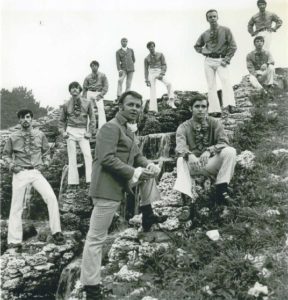Bob Kuban & the In-Men only had one major hit. That one hit was a record called “The Cheater” which stormed up the charts in 1966. And maybe the band’s story would have ended there if it wasn’t for the compelling story that surrounds them, in particular lead singer Walter Scott, and keeps people interested to this day.
Kuban was a drummer from St. Louis. He was just out of high school when he put together his In-Men there in 1964. They were eight pieces strong and included a horn section, which was something of an anachronism given that it was the year that the British Invasion, with its emphasis on guitars, was arriving on these shores.
The British Invasion wasn’t the only thing that was going on at that time. The Vietnam War was heating up and musicians were just as susceptible to the draft as anyone else. In order to keep their deferments, members of the In-Men had to stay in college or work day jobs as teachers. That impacted the band’s ability to tour much beyond their local area.

They recorded “The Cheater” in St. Louis, and released it on Musicland Records in 1966. Originally the song had been written in the first person, but as Kuban told writer Rick Simmons, he was looking for something with energy, excitement, and a driving rhythm, so the narrative was changed to third person and a bridge was added.
Whatever changes they made worked very well. The record charged up the Billboard Hot 100 until it peaked at #12. It was a million-seller and gold record award-winner. The success of “The Cheater” led to nationwide touring and television appearances for the band, including a spot on American Bandstand.
“The Cheater” was also a hit overseas and a tour was planned but the United States government stepped in at that point and let Kuban know that if the band went overseas their deferments would be pulled and they would all be re-classified 1-A. Instead of touring, they returned to the studio. They were looking for a strong follow-up to “The Cheater,” but what they got was “The Teaser,” a song that Kuban himself had little use for and only managed to reach the #70 spot on the Pop chart.
The next single, a cover of the Beatles song “Drive My Car,” didn’t even do that well, only reaching #93. Still, Bob Kuban & the In-Men had placed three singles in the Top 100 in a single year, and that was promising to say the least. But the future would not turn out to be as bright as it looked, primarily because the band’s manager, Mel Friedman, was plotting, unbeknownst to Kuban, to pull lead singer Scott out of the group and push him into a solo career.
There they were, a band with three chart singles in one year, including a million-seller, and yet they were on the verge of dissolution. Eventually, Scott did leave for that solo career, a move that didn’t work out for him, or for Kuban and the band because none of them was able to reach the heights they had hit with “The Cheater.”
Flash forward almost 20 years and Bob Kuban & the In-Men, including Scott who had realized his mistake, were planning a reunion concert in 1983. Then suddenly and mysteriously, Scott disappeared. It took nearly four years to find his body at which time it emerged that Scott had been shot and thrown into a water tank. In a shocking twist of fate, given that Scott was the lead singer on “The Cheater,” the perpetrator turned out to be the then-boyfriend of Scott’s second wife. In addition to Scott, he killed his own wife and was given two life sentences for his crimes. Scott’s ex-wife was sentenced to five years for hindering the prosecution of the murders.
Kuban continues to tour around the Midwest with his band to this day. He remains bitter about the way that Friedman undermined his band when they were on the brink of big-time success. Kuban was recognized by the Rock and Roll Hall of Fame in their permanent exhibit of one-hit wonders.





Comments